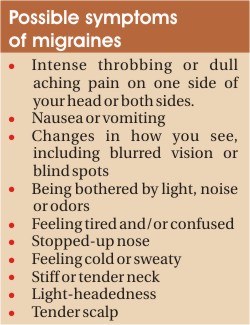|
Health
What
causes Migraine Headaches?
Migraine
headaches seem to be caused in part by changes in the level
of a body chemical called serotonin. Serotonin plays many
roles in the body, and it can have an effect on the blood
vessels. When serotonin levels are high, blood vessels constrict
(shrink). When serotonin levels fall, the blood vessels dilate
(swell). This swelling can cause pain or other problems. Many
things can affect the level of serotonin in your body, including
your level of blood sugar, certain foods and changes in your
estrogen level if you're a woman.
Are
there different kinds of migraine headaches?
Yes. The most common are classic migraine and common migraine.
Classic migraines start with a warning sign, called an aura.
The aura often involves changes in the way you see. You may
see flashing lights and colors. You may temporarily lose some
of your vision, such as your side vision.
You may also feel a strange prickly or burning sensation,
or have muscle weakness on one side of your body. You may
have trouble communicating. You may also feel depressed, irritable
and restless.
Auras
last about 15 to 30 minutes. Head pain usually follows the
aura, though sometimes the pain and aura overlap, or the pain
never occurs. The head pain of classic migraines may occur
on one side of your head or on both sides.
 Common
migraines don't start with an aura. Common migraines may start
more slowly than classic migraines, last longer and interfere
more with daily activities. The pain of common migraines may
be on only one side of your head. Common
migraines don't start with an aura. Common migraines may start
more slowly than classic migraines, last longer and interfere
more with daily activities. The pain of common migraines may
be on only one side of your head.
Migraines
may last from 4 to 72 hours. They may happen only once or
twice a year, or as often as daily.
What
things may set off a migraine?
Certain things that may contribute to migraines include the
following:
*Strong
odors, bright lights or loud noises
*Changes in weather or altitude
*Being tired, stressed or depressed or the let-down after
a stressful event
*Changes in sleeping patterns or sleeping time
*Missing meals or fasting
*Menstrual periods, birth control pills or hormones
How are migraines treated?
There are 2 types of migraine treatments. Some treatments
are used to relieve the
| Tips
on reducing the pain |
*
Lie down in a dark, quiet room.
* Put a cold compress or rag over your forehead.
* Massage your scalp using a lot of pressure.
* Put pressure on your temples. |
headache
pain. Most of these treatments should be started as soon as
you think you're getting a migraine. The other group includes
treatments that are used to prevent headaches before they
occur.
Can
nonprescription medicines help relieve the pain?
Yes. Nonprescription medicines can help migraine pain. They
include aspirin, acetaminophen (one brand name: Tylenol),
an acetaminophen, aspirin and caffeine combination (one brand
name: Excedrin Migraine), ibuprofen (one brand name: Motrin),
naproxen (brand name: Aleve), and ketoprofen (brand name:
Orudis KT).
What
about prescription medicines?
People
with more severe pain may need prescription medicine. A medicine
called ergotamine (brand name: Ergostat) can be effective
alone or combined with other medicines (some brand names:
Cafergot, Ercaf, Wigraine). Dihydroergotamine (brand names:
Migranal, D.H.E. 45) is related to ergotamine and can be helpful.
Other
prescription medicines for migraines include sumatriptan (brand
name: Imitrex), zolmitriptan (brand name: Zomig), naratriptan
(brand name: Amerge) rizatriptan (brand name: Maxalt), almotriptan
(brand name: Axert) and fravatriptan (brand name: Frova).
Many combinations
of medicines (one brand name: Midrin) are also available.
If the
pain won't go away, stronger medicine may be needed, such
as a narcotic (brand name: Stadol nasal spray) or medicines
that contain a barbiturate. These medicines can be habit-forming
and should be used cautiously.

Can
medicine help prevent migraines?
Yes. Medicine to prevent migraines may be helpful if your
headaches happen more than twice a month or if your headaches
make it hard for you to work and function. Examples of medicines
used to prevent migraines include propranolol (brand name:
Inderal), timolol (brand name: Blocadren), divalproex (brand
name: Depakote) and some antidepressants.
What
else can I do to prevent migraines?
Try to avoid foods or other things that seem to cause migraines
for you. Get plenty of sleep. Try to relax and reduce the
stress in your life.
Copyright
(R) thedailystar.net 2004 | 